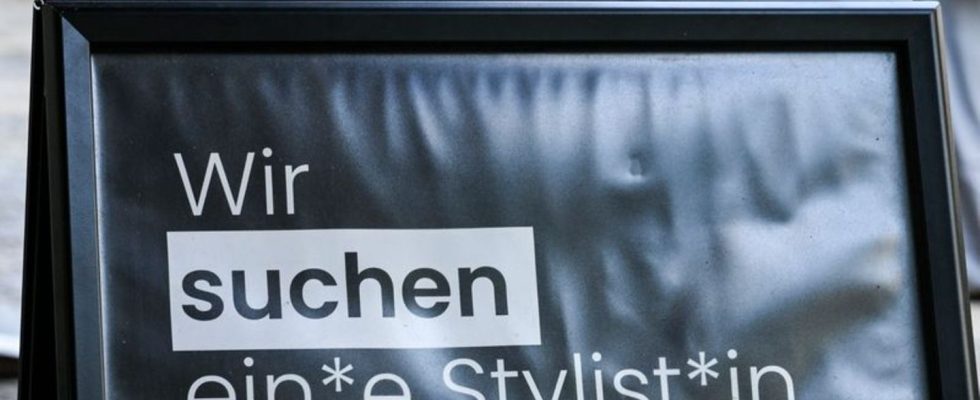What does gender-equitable writing look like? Now the topic also plays a role in coalition talks. A party that has not previously been known for gender bans is involved.
The dispute over gendering with colons, internal Is, underscores or asterisks is now also boiling up in politics. In addition to terms such as equality and inclusion, words such as culture war and populism are also increasingly playing a role. Bavaria’s Prime Minister Markus Söder (CSU) wants to ban gender in schools and authorities in the Free State. Something similar is also emerging in Hesse. Here the CDU and SPD, who are negotiating a new government alliance, have already caused a stir with a joint key issues paper after their first explorations.
In Hesse, both parties want to “stipulate that gendering with special characters will be avoided in state and public institutions (such as schools, universities, radio)” – based on the German Spelling Council.
Bans and efforts in federal states
There are already similar bans or efforts in some federal states. At schools in Saxony and Saxony-Anhalt, for example, special characters for gender-neutral language are rejected. In Saxony, couple forms such as students and gender-neutral forms such as teachers are recommended. In essays, gender forms are marked as errors. Saxony-Anhalt’s Ministry of Education prohibits students from using gender asterisks and the internal I, but leaves room for maneuver when evaluating their texts.
Hesse’s Prime Minister Boris Rhein (CDU), like Söder, has just won a state election. He tells the German Press Agency: “I don’t want to dictate to anyone how they speak. But I think it’s important that no one at a university or school receives lower grades in a homework or an exam because, for example, they have the gender asterisk waived.”
In his own words, Rhein experiences “enormous support for this topic” alongside “one or two professional gender people”. He finds it difficult to listen to or read gender forms. He himself also often uses couplets such as “citizens”. Many people would be excluded with “bulky” gender special forms. “This is the exact opposite of inclusion,” says the Hessian CDU leader.
The SPD is not yet known for gender bans. In Hesse, in her own words, she “does not want to take part in debates about this before the coalition negotiations are concluded.” Meanwhile, there is headwind from the party’s younger generation. Juso regional leader Lukas Schneider complains: “Such restrictions on gender-appropriate language only serve to promote division and exclude people.” The Jusos are threatening not to agree to a coalition agreement “if this backward-looking demand is still included in it.”
Opinion of teaching associations and parties
Teachers’ associations also criticize – in Hesse and Bavaria. There, Söder recently defended the announced gender ban: “I believe that gender divides our society more than anything else.” The CSU boss has left questions about implementation and possible sanctions in schools and administration unanswered for the time being. In Hesse, too, this initially appears nebulous.
Is there also ideology or populism behind gender bans? The Hessian AfD parliamentary group considers special gender symbols to be a “highly ideological project of a minority” and “misspelled German”. This would also be more difficult for non-native speakers.
The Gießen political scientist Dorothée de Nève speaks of successful “agenda setting” by the AfD. Their demand in the Hessian election campaign to abolish special gender symbols can be found “almost word-for-word” in the key issues paper of the CDU and SPD. This shows “how far the Christian Democrats and Social Democrats have already become involved in the AfD’s culture war.” The GEW education union in Hesse also judges: “The coalition parties seem to want to give in to a populist demand without necessity. In doing so, they are strengthening right-wing populism instead of fighting it.”
According to Hesse’s Prime Minister Rhein, it is “not about culture wars and identity politics, but rather about the fact that the German Spelling Council has set rules that make it easier and simpler to read texts.” In July, this committee initially decided not to classify gender symbols as a core component of German orthography. In a new addition, the council also lists the gendering inside the word – colon, underscore and asterisk. However, these are still not regular characters.
Hesse’s Green Party leader Mathias Wagner explains: “The CDU and SPD have certainly not copied from the AfD.” However, it is true that in the exploratory paper, Christian and Social Democrats “deal a lot with moods and perceived problems and very little with solutions to real challenges.” The Greens have previously ruled in Hesse with the CDU – but have now been rejected by them.
The State Working Group (LAG) of Hessian women’s offices is against a gender ban. “Administrative language must address and represent all people, regardless of their gender. Language unconsciously shapes our perception of the world,” says the LAG.
According to its own statement, the Association for Education and Upbringing (VBE) does not know of any primary schools in Hesse that teach special gender symbols. However, this “dealing with diversity” is an issue in secondary schools. Gender asterisks should not play a role in grades.
The Goethe University Frankfurt supports the effort “to create language that is sensitive to gender and discrimination”. In 2021 she presented recommendations for this. In general, however, university members can freely choose their language in public and on business.
Hessischer Rundfunk is “interested in waiting for the negotiations of the designated state government and the result on the topic of gender in the coalition agreement”. Gender-sensitive language is used in HR “because it means everyone, shows everyone and addresses everyone”. However, the type of gendering is not specified to the station’s editorial team.
The German Association of Journalists fears political and illegal influence with regard to broadcasting and press freedom. Bans against gender-appropriate language changes are a “backward fear reaction”.

